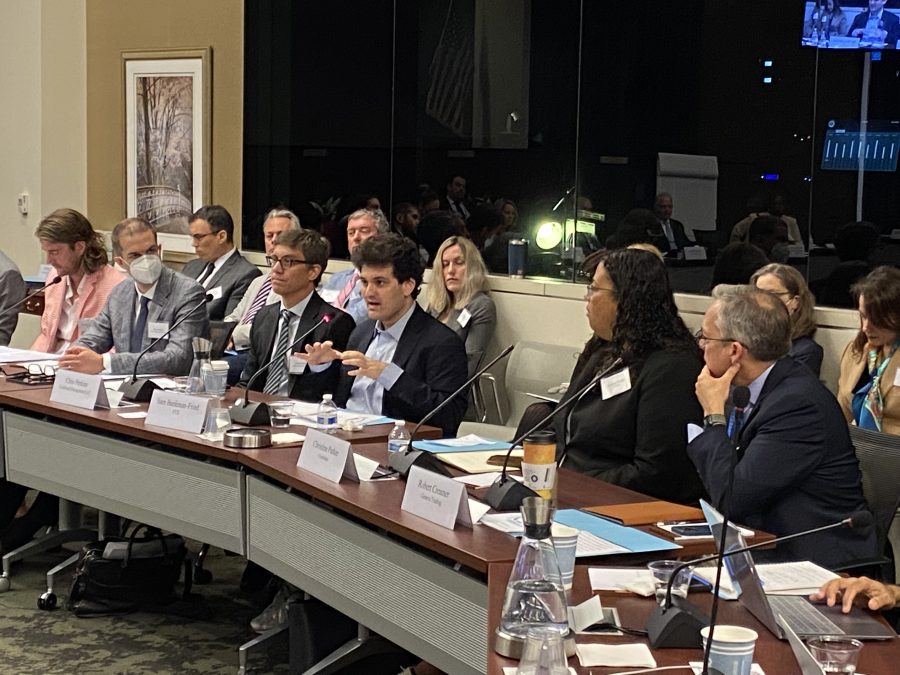CFTC roundtable on FTX proposal highlights barriers in clearing of digital vs physical assets

Quick Take
- The CFTC has been working on FTX’s proposal to allow a relatively new market structure for its derivatives trading for much of the past year, including several months of open public comment.
- Today, the agency hosted a roundtable, welcoming dozens of stakeholders from traditional derivatives trading as well as the crypto industry to its offices to voice criticism and support for the proposal.

Cotton or oil markets cannot settle like Bitcoin — a fairly obvious point, but the distinction between the two was at the center of a May 25 roundtable hosted by the Commodity Futures Trading Commission.
The roundtable centered on the CFTC’s consideration of a proposal from crypto exchange FTX to disintermediate derivatives trading on its platform.
Stakeholders from the derivatives trading industry appeared in force, with representatives from exchange operators CME and ICE joined by others from Citi, Goldman, FTX, Citadel, JPMorgan and BlackRock.
FTX CEO Sam Bankman-Fried was also in attendance, as were representatives from crypto firms including Coinbase, CoinFund, Eris Clearing and Pantera Capital.
Despite repeated comments from participants — like LSE professor David Murphy, who said “I don’t want to talk about crypto” — the proposal originates from FTX, a crypto exchange firm that has been operating this trading structure internationally for several years and is trying to get such a structure in its US branch.
Consequently, the specifics of crypto trading loomed large over the conversation — though even FTX has very much left open the door to applying this model to other assets down the road. While there were clearly drawn battle lines among certain participants, the overall conversation avoided bombast. This may largely be due to the density of the conversation, which focused on fairly wonkish parts of market structure.
FTX’s proposal does away with futures commissions merchants, or FCMs, a critical link in the chain of risk allocation in traditional derivatives markets.
As with prior debates on the proposal, a central question is whether FTX’s structure will extend to those more traditional markets. Broadly speaking, no one at the table seemed bothered by the notion of crypto traders dealing with the effects of 24-hour markets and real-time liquidations.
However, that changes when applied to people who depend on price stability in things like energy and food products.
“In a scenario with the auto-liquidation scheme,” said Nelson Neale of the National Council of Farmer Cooperatives. “For a crypto trader, a bad day certainly, but perhaps not as bad as if we consider the same situation for the average American farmer.”
Consequently, those in favor of the proposal emphasized that it would not flip a switch to allow all markets to do away with FCMs.
As Robert Creamer of Geneva Trading asked directly: “Sam, do you see or can you envision certain market types in which your model would not work as effectively as you would like or as market participants would expect?”
“When you’re looking at physical agricultural products,” answered Bankman-Fried. “I don’t want to say those are unsolvable problems, but those are problems that would require further work and further thought.”
Robert Steigerwald, the event’s moderator, at one point called the argument "the fallacy of universalization of this argument.”
JP Morgan’s Emma Richardson noted the question of gating markets that would be approved. The question is, she put it: “How we might slow down that process a little bit as products outside of crypto are proposed?”
Bankman-Fried likewise emphasized that the current proposal doesn’t prevent the CFTC from rejecting or questioning future market players looking to apply such a structure to new assets. However, there were lingering questions about how responsive the CFTC would be to those new players.
Disclaimer: The former CEO and majority shareholder of The Block has disclosed a series of loans from former FTX and Alameda founder Sam Bankman-Fried.
© 2025 The Block. All Rights Reserved. This article is provided for informational purposes only. It is not offered or intended to be used as legal, tax, investment, financial, or other advice.







